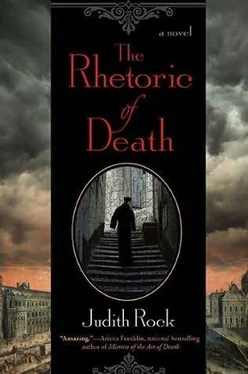Judith Rock - The Rhetoric of Death
Здесь есть возможность читать онлайн «Judith Rock - The Rhetoric of Death» весь текст электронной книги совершенно бесплатно (целиком полную версию без сокращений). В некоторых случаях можно слушать аудио, скачать через торрент в формате fb2 и присутствует краткое содержание. Жанр: Исторический детектив, на английском языке. Описание произведения, (предисловие) а так же отзывы посетителей доступны на портале библиотеки ЛибКат.
- Название:The Rhetoric of Death
- Автор:
- Жанр:
- Год:неизвестен
- ISBN:нет данных
- Рейтинг книги:3 / 5. Голосов: 1
-
Избранное:Добавить в избранное
- Отзывы:
-
Ваша оценка:
- 60
- 1
- 2
- 3
- 4
- 5
The Rhetoric of Death: краткое содержание, описание и аннотация
Предлагаем к чтению аннотацию, описание, краткое содержание или предисловие (зависит от того, что написал сам автор книги «The Rhetoric of Death»). Если вы не нашли необходимую информацию о книге — напишите в комментариях, мы постараемся отыскать её.
The Rhetoric of Death — читать онлайн бесплатно полную книгу (весь текст) целиком
Ниже представлен текст книги, разбитый по страницам. Система сохранения места последней прочитанной страницы, позволяет с удобством читать онлайн бесплатно книгу «The Rhetoric of Death», без необходимости каждый раз заново искать на чём Вы остановились. Поставьте закладку, и сможете в любой момент перейти на страницу, на которой закончили чтение.
Интервал:
Закладка:
“Oh, it’s you,” she said, with a relieved smile. “But you should still be resting, maitre!”
He managed a smile. “I’m well enough. Forgive me for startling you, madame.” His eyes went toward the back of the shop, where he heard Pernelle’s voice.
“Yes, maitre, she is there, helping clean up our ass-brained apprentice’s mess. Roger would insist on letting him practice pastry on Sunday. Are you come to see your lady?”
“One small moment. Madame, did you sell gaufres yesterday to a woman in a mourning veil?”
“I did not. Why?” She finished arranging the cakes on their wooden tray and stepped back to look critically at them, her head on one side.
“But you did make gaufres?”
She looked up. “How did you know?”
Not wanting to get Marie-Ange in trouble, Charles didn’t reply. Instead he said, “We’ve had another tragedy in the college. Someone left poisoned gaufres for Antoine.”
“Mon Dieu!” She pressed both hands to her mouth. “Is he-?”
“He didn’t eat them, madame, he’s well. Sadly, however, his tutor did. And died.”
“St. Benedict protect us! As I hope for salvation, maitre, I never poisoned any gaufres!”
“Calm yourself, madame, I never thought you did. But I wondered if someone might have bought them here and then poisoned them.”
“Poison?” Marie-Ange burst out of the workroom, towing Pernelle behind her. “Who is poisoned?”
“Marie-Ange, no, I told you to keep mademoiselle out of sight!” Madame flapped her apron at them and Pernelle stopped, smiling at Charles. Marie-Ange ran to him and pulled anxiously at his sleeve.
“Is it Antoine, maitre?”
“Not Antoine, his tutor,” Charles said. “Antoine is fine.”
The little girl’s worried frown relaxed. Pernelle ignored Mme LeClerc’s clucking and walked quickly down the shop to him.
“More murder? You look terrible, Charles.”
“More murder, yes.” But he was smiling. The shadows under her eyes were gone and the pink in her cheeks contrasted prettily with the shabby gray kirtle and bodice she wore, which were clearly Mme LeClerc’s. A flour-dusted apron bunched the wide gown in thick folds around her waist, and the skirt barely covered her white-stockinged calves.
“Veiled, you said, maitre?” The baker’s wife was frowning and staring at nothing. “I did see a woman in mourning pass by today.”
“When? Are you sure it was a woman?”
“An hour or two ago. I assumed it was a woman. But those mourning veils hide most everything, don’t they?” She shook her head scornfully. “Those veils! If you’re so much in mourning you don’t even want to see where you’re going, then why be out in the street? Why not stay home with the shutters closed and black bed hangings and all? Unless you just don’t want to live anymore and you’re trying to get run over, sin though that would be, though it’s so easy to be hurt in traffic, it’s hardly fair to count it as sin. But losing loved ones takes us all different ways, I suppose. Still, in that flaunting petticoat of hers, she can’t have been all that deeply mourning, now can she?”
“Was the woman you saw carrying anything?” Charles asked, not daring to look at Pernelle, who was openly laughing at Mme LeClerc’s observations.
Before Mme LeClerc could answer, someone coughed politely and they all turned toward the street door. A solidly built man in brown breeches and jacket stood there. He was smiling at them, but most of his smile was landing on Pernelle, who caught Marie-Ange by the hand and disappeared into the workroom. Mme LeClerc moved briskly around the counter. Taking his cue from her hurry, Charles smiled affably and stood between the man and the back of the shop. The newcomer was wigless. His hair only reached the nape of his neck and he wore both a sword and a pistol on his thick leather belt. Everything about him said police.
“Monsieur? Back again?” Mme LeClerc said sharply, demanding the man’s attention. “I told you before that we are not open.”
“You did, madame,” he said, with an easy smile. “But if you sold me a little cream cake, I think no one would know.” He nodded toward the workroom door. “For not being open, you have a lot of help today. From far away, as I could tell from the young woman’s voice when you gave me that magnificent brioche a while ago.”
Charles tensed. So much for La Reynie’s lack of interest in the Provencal-speaking fugitive in the beggars’ Louvre, damn the man. His flies there must have told him she had left. Of course he would start searching at the college door. Charles moved closer to the man.
“I always have plenty of help,” Mme LeClerc said tartly. “And my niece will not thank you for calling her a foreigner.” She waved away the man’s sous and handed him a cake. “Adieu, monsieur.” A pointed “good-bye” instead of the shopkeeper’s hopeful “see you soon.” She walked purposefully out from behind the counter and toward the street, forcing him backward. As he went, he studied Charles as though memorizing him. Then the man dodged among carriages and riders to lean against the bookshop wall across the street, nibbling at the cake and watching the bakery through the traffic.
“Police,” Mme LeClerc said flatly, slamming the door and shaking her head. “He keeps trying to see Mademoiselle Pernelle.”
“And you let her speak to him?” Charles demanded.
“Of course not!” She dropped the bar across the door. “I should have barred the door before, but I thought that would only convince him we had something to hide. When he walked in the first time, I had just called out to the back room that I wanted the work table scrubbed and she was answering me. The man’s master had been here earlier.”
“What? Lieutenant-General La Reynie?”
“Himself. Pretending he was only making sure we were not selling when we shouldn’t. Your Pernelle was in here helping me scrub these counters. And since then, his man”-she glanced pointedly across the street-“has been making me nervous as a wet hen. I don’t like it. I’m sure she’s done nothing that’s police business, nor you, either!”
Ignoring that, Charles went to the door to the old stairs and tried the latch. It was locked, as the rector had said. “Your key is lost, I hear, madame?”
“And our back door is bricked up. If your young lady needs a sudden way out, the only way is through a little back window into your courtyard. Unless St. Anthony takes pity and finds our key to the stairway door.”
“Madame, I fear,” Charles said slowly, “that Mademoiselle Pernelle must disappear. Can you borrow your apprentice’s other set of clothes for her? Cut her hair, blacken some teeth with soot. She can be a mute so she doesn’t have to speak. If the worst comes to the worst and you have to send her through the window, tell her to go to our porter and ask for me. It’s the best I can think of.”
“It’s well enough and well thought. We will do it. And who would expect you to think, maitre, with people being poisoned?” She glanced across the street. “Wait, I’ll give you a reason for coming here.” She clattered into the back and reappeared with a round loaf, dark with rye, tossing it from hand to hand. “If he asks, you can say it’s a gift and I forgot to send it to you yesterday. It’s hot, be careful!”
Charles wrapped it in a fold of his cassock. “Thank you for this, and for everything, madame. I will think of somewhere else your-ah-new apprentice can go. If you need me before tomorrow, tell the porter. And pray!” He went out into the street, a desperate urgency at his heels. He had to get Pernelle away from here and on the road to Geneva. Wishing he could find the entrance to her Huguenot highway, he put up his hand to ring the postern bell and froze. The policeman was still across the street, talking with another, even larger armed man and pointing at the bakery. Charles turned hastily back to warn Mme LeClerc, but two more men, one on foot and one on horseback, closed on him from both sides.
Читать дальшеИнтервал:
Закладка:
Похожие книги на «The Rhetoric of Death»
Представляем Вашему вниманию похожие книги на «The Rhetoric of Death» списком для выбора. Мы отобрали схожую по названию и смыслу литературу в надежде предоставить читателям больше вариантов отыскать новые, интересные, ещё непрочитанные произведения.
Обсуждение, отзывы о книге «The Rhetoric of Death» и просто собственные мнения читателей. Оставьте ваши комментарии, напишите, что Вы думаете о произведении, его смысле или главных героях. Укажите что конкретно понравилось, а что нет, и почему Вы так считаете.












